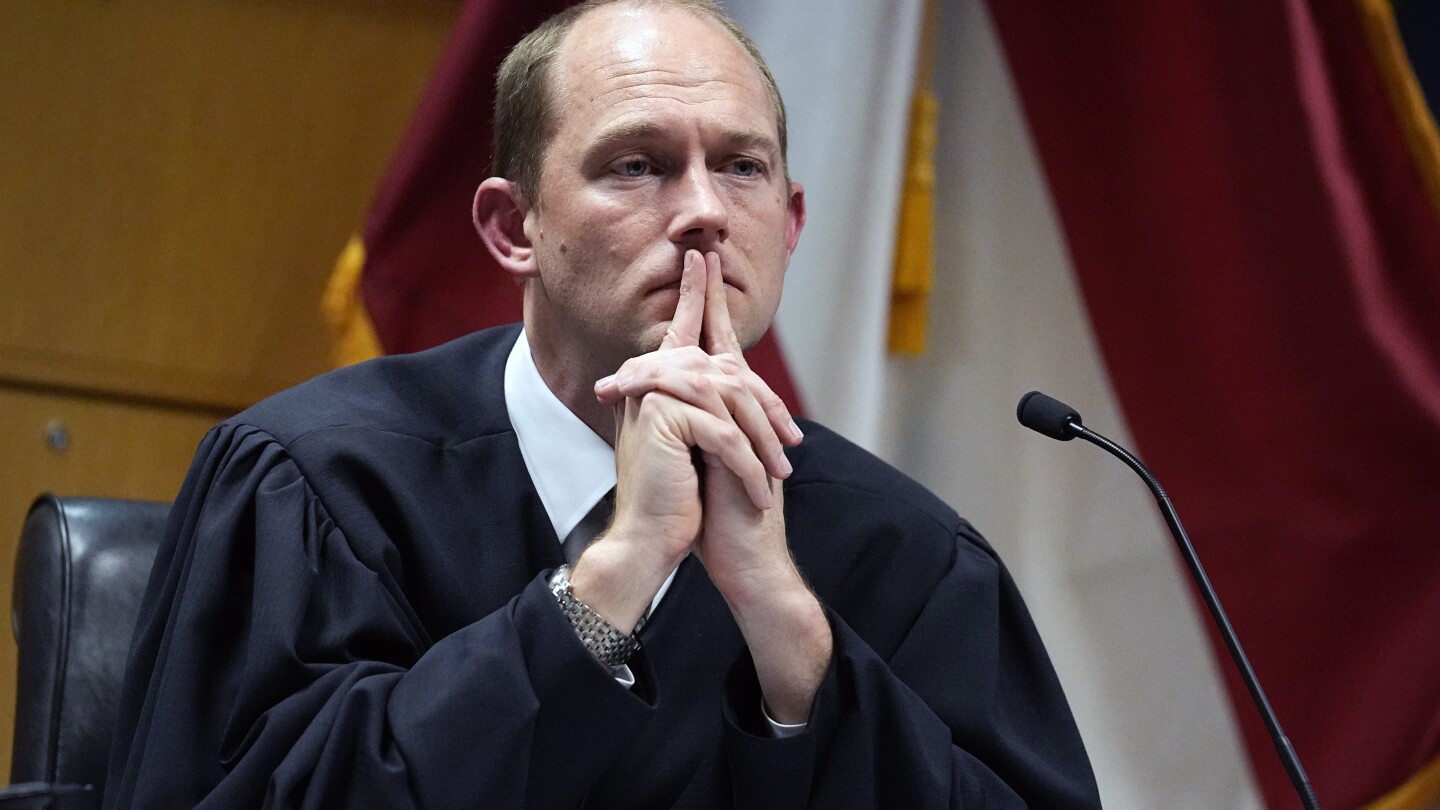Judge continues preliminary motions in Georgia election meddling case
ATLANTA (AP) - The allegations against former President Donald Trump in Georgia election interference case seek to criminalize the political speech and Former President Donald Trump's lawyers argue that the allegations against him in Georgia election interference case aim to criminalize political speech and advocacy protected by the First Amendment. Fulton County Superior Court Judge Scott McAfee will hear arguments on the application and two preliminary motions filed by former Georgia Republican Party Chairman David Shaffer. The case continues despite defense efforts to remove District Attorney Fannie Willis from office due to her romantic relationship with Special Counsel Nathan Wade. In August, Willis received an indictment against Trump and 18 others accusing them of participating in a scheme to illegally overturn the 2020 presidential election in Georgia. All of the defendants were charged with violating Georgia’s extensive anti-racketeering law, along with other alleged crimes. No trial date has been set, but Willis has asked to start in August.

Pubblicato : 4 settimane fa di admin in Politics
ATLANTA (AP) – The allegations against former President Donald Trump in Georgia election interference case seek to criminalize the political speech and advocacy that the First Amendment protects, his lawyers argued in a lawsuit challenging the indictment.
Fulton County Superior Court Judge Scott McAfee plans to hear arguments on that application and on two preliminary motions filed by former Georgia Republican Party Chairman David Shaffer during a hearing scheduled for Thursday. Shaffer’s lawyers argue that he acted legally when he and other states Republicans signed a certificate claiming that Trump won the 2020 presidential election in Georgia and claiming to be the state’s “duly elected and qualified” electors.
McAfee is proceeding with the case, even though Trump and other defendants have said they plan to ask the Georgia Court of Appeals to disqualify District Attorney Fannie Willis. The judge earlier this month rejected defense efforts to remove Willis and her office because of her romantic relationship with Special Counsel Nathan Wade, but he did granted leave to the defendants to look for a review of his decision by the Court of Appeal.
In August, Willis received an indictment against Trump and 18 others accusing them of participating in a large-scale scheme to try to illegally overturn the 2020 presidential election in Georgia, which the Republican incumbent narrowly lost to Democrat Joe Biden. All of the defendants were charged with violating Georgia’s extensive anti-racketeering law, along with other alleged crimes.
Four people pleaded guilty after reaching deals with the prosecution. Trump and the others have pleaded not guilty. No trial date has been set, but Willis has asked to start in August.
Trump’s attorneys wrote in their filings that the crimes their client is accused of fall into five distinct areas: Republican voter certificates introduced by Georgia Republicans; request to the Speaker of the Georgia House of Representatives to call a special legislative session; filing a lawsuit to challenge the 2020 presidential election; a Phone call in January 2021 between Trump and Georgia Secretary of State Brad Raffensperger; and a letter sent to Raffensperger in September 2021.
“The First Amendment, affording the broadest protections to political speech and discussion regarding government affairs, not only covers but encourages precisely the kind of conduct attacked in this indictment,” Trump’s lawyers wrote.
Prosecutors countered that the indictment “is based on criminal acts, not speech.” They write that wherever speech is involved, it is “speech that is an integral part of criminal conduct, fraud, perjury, threats, criminal inducements, or lies that threaten to defraud and injure the government.”
Most of the charges against Shaffer relate to his involvement in helping organize a group of Georgia Republicans to give Electoral College votes to Trump, even though the state’s election was certified in Biden’s favor. The charges against him include impersonating a public servant, forgery, false statements and writings and attempting to file false documents.
His attorneys wrote in a filing that prosecutors sought to “punish Mr. Shaffer’s criminal conduct, which was legal at the time.” They argued that Shaffer was “attempting to comply with the advice of counsel” and the requirements of the Election Counting Act.
Shaffer’s lawyers also want three phrases struck from the indictment: “duly elected and qualified presidential electors,” “false electoral college votes” and “legitimate electoral votes.” They argue that these phrases are being used to argue that the Democratic election was valid and the Republican election in which Shafer participated was not. They argue that these are “prejudiced legal conclusions” about issues that should be decided by the judge or jury at trial.
Prosecutors alleged that Shaffer used “incorrect, extraneous facts and legal conclusions … to suggest in any way that he was or may have been a legitimate presidential elector at the time of the allegations.” They agreed that the indictment included “disputed” and “unproven” allegations, but said “this is not and never has been grounds for dismissing an indictment.”
Willis and her team suffered a few setbacks in March. Although McAfee did not honor requests for protection to remove her from the case, he harshly criticized her actions and told Wade, her chosen chief prosecutor on the case, must be withdrawn so Willis can continue the prosecution. Just days earlier, the judge dismissed six of 41 charges in the indictment, including three against Trump, finding that prosecutors did not provide enough details about the alleged crimes.
